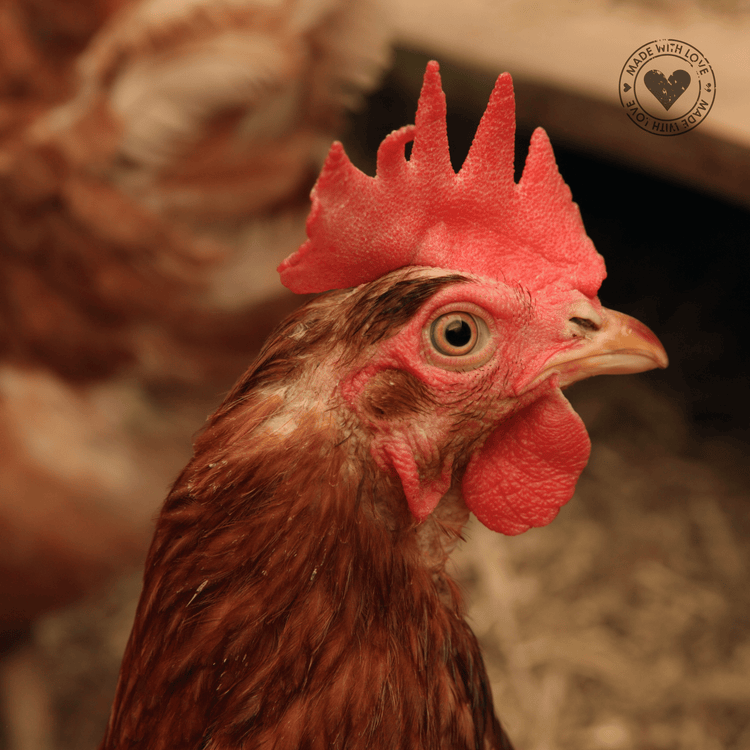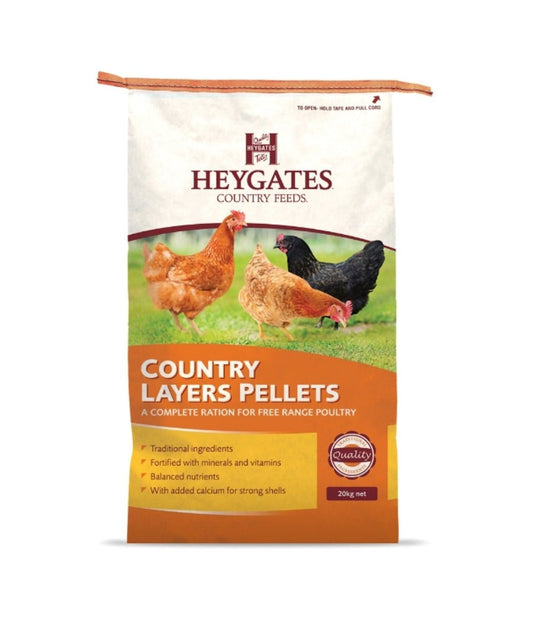
Chicken Feed
Heygates Country Layers Pellets 20kg
Regular price
£9.99
Sale price
£9.99
Regular price
Unit price
/per
Complete feed for laying hens.
Heygates Duck & Goose Pellets 20kg
Regular price
£12.99
Sale price
£12.99
Regular price
Unit price
/per
High-nutrient pellets for waterfowl health.
Heygates Mixed Poultry Corn 20kg
Regular price
£10.99
Sale price
£10.99
Regular price
Unit price
/per
Traditional whole and cracked maize blend.
Fancy Feeds Mixed Corn
Regular price
from £5.99
Sale price
from £5.99
Regular price
Unit price
/per
An appetising blend of English wheat and cut maize by Fancy Feeds.A quality mixed feed/treat that is a natural source of fibre. It is ideal for chicken, ducks a geese.A quality mixed feed/treat tha...
Fancy Feeds Layers Pellets
Regular price
from £5.99
Sale price
from £5.99
Regular price
Unit price
/per
Ideal for free-ranging and penned birds alike, Layers’ Pellets are formulated to provide a complete balanced diet for all types of adult and laying poultry, ducks, geese and bantams.
Saracen Home Farm Mixed Corn 20kg
Regular price
£11.99
Sale price
£11.99
Regular price
Unit price
/per
A traditional blend of whole and cut cereal grains
Can be used as a scratch feed to help keep poultry happy, active, and interested
Contains no GM ingredients
Feed as and when required as a treat ...
Bartholomews Peanuts 18kg
Regular price
£33.99
Sale price
£33.99
Regular price
Unit price
/per
An excellent source of fat, fibre and protein, peanuts are an excellent source of nourishment for all wild birds, especially during the colder winter months.
Heygates Layers Pellets with Flubenvet 20kg
Regular price
£13.99
Sale price
£13.99
Regular price
Unit price
/per
Medicated pellets for worm control.
Allen & Page Super Mixed Corn
Regular price
from £5.99
Sale price
from £5.99
Regular price
Unit price
/per
Super Mixed Corn is made from wheat with Non-GM maize, peas, added calcium and grit. A healthy and nutritious mixed corn treat for your birds.
Super Mixed Corn is made from wheat with Non-GM maize,...
Fancy Feeds Supreme Mixed Corn 20kg
Regular price
from £8.99
Sale price
from £8.99
Regular price
Unit price
/per
Fancy Feeds Supreme Mixed Corn is an appetising blend of English wheat and cut maize plus tasty extras chosen for their appeal to the bird as well as their nutritional benefits.
Perfect as Chicken ...
Allen & Page Baby Chick Crumbs
Regular price
from £5.99
Sale price
from £5.99
Regular price
Unit price
/per
Chick crumbs from hatching up to 6-8 weeks
Allen and Page Small Holder Range Baby Chick Crumbs is suitable for chicks when fed from hatching up to 6-8 weeks. For a smooth changeover to Grower pelle...
Bartholomews Winter Bird Feed 20kg
Regular price
£16.99
Sale price
£16.99
Regular price
Unit price
/per
A broad range of 15 seed types and sizes, including flakes which are better digested by birds. Designed to nourish all birds during a period when food is short and difficult to find. Being the life...
Heygates Layers Pellets with Flubenvet 5kg
Regular price
£7.99
Sale price
£7.99
Regular price
Unit price
/per
Medicated pellets for worm control.
Feldy Chicken Pecker Treat Balls Seaweed
Regular price
from £5.99
Sale price
from £5.99
Regular price
£5.99
Unit price
/per
An innovative pecker treat ball. No fillers or binders and free from palm oil. Use a fat ball feeder to feed or simply scatter on the ground. Provides necessary nutrients. The perfect boredom buste...
Allen & Page Organic Layers Pellets 20kg
Regular price
£24.99
Sale price
£24.99
Regular price
Unit price
/per
Organic Layers Pellets is a farmyard layers feed with vitamins, minerals and omega 3 oils for good sized eggs and natural golden yolks. Feed from 16 weeks on an ad lib basis. Suitable from 16-18 we...
Oyster Shell (Standard Grade) - 25kg
Regular price
£13.25
Sale price
£13.25
Regular price
Unit price
/per
Jondoe 100% Oyster Shell Standard Grade.
Oyster shell is an excellent source of calcium which is soluble and is digested by the bird, enabling her to form strong egg-shells. A constant supply of Oy...
Flint Grit (Mixed Size) - 25kg
Regular price
£12.99
Sale price
£12.99
Regular price
Unit price
/per
Jondo Mixed Poultry Grit - poultry should always have access to grit and oyster shell especially if they are confined in a run or indoors.
Bartholomews F1 Wild Bird Seed 20kg
Regular price
£14.99
Sale price
£14.99
Regular price
Unit price
/per
An Economy Mixture good for general all round feeding on a budget including wheat, maize grits, dari, red and white millet, split peas, black sunflower, barley and groats.
Use left/right arrows to navigate the slideshow or swipe left/right if using a mobile device






















